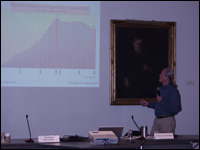Registration
You will receive an email confirming your registration.
IMGXYZ926IMGZYXEnthusiasm for nuclear energy has grown along with concerns about climate change and energy security. Yet it’s not entirely clear that a resurgence in the global nuclear industry is underway. In fact, the opposite may be true. The Carnegie Endowment's Nonproliferation Program hosted Mycle Schneider, author of the 2007 World Nuclear Industry Status Report, to provide an in-depth analysis of some of the challenges facing the nuclear energy industry. Carnegie's Sharon Squassoni moderated the discussion.
Mycle Schneider questioned whether the world civilian nuclear industry is capable of achieving a "nuclear renaissance," arguing that the industry is struggling to sustain current global capacity. Schneider utilized historical trends and the current situation to assess the possibility for future nuclear energy expansion.
Key Points
- Declining Share of Electricity Market. Although the IAEA and other organizations continue to posit considerable growth for nuclear energy, the technology’s share of electricity generation has begun to decline. Complicating the picture is the need to replace aging reactors as they reach the ends of their lives. Forecasts of growth often use optimistic assumptions about how long aging reactors can operate.
- Recent Construction Experience in France and Finland point to construction difficulties, and in the case of Finland, significant cost overruns. Other countries may face similar or greater problems.
- Education Crisis. The nuclear industry is caught between a bow wave of retirements (as high as 40% in places) and a dearth of qualified entrants into the nuclear workforce. One estimate is that 26,000 workers will need to fill jobs at existing nuclear plants over the next 10 years in the U.S.
Schneider concluded "nuclear energy will hinder rather than favor reliable, sustainable energy policies." Rather than build capacity to meet consumption, efficiency needs to improve and consumption needs to decline if climate change goals are to be met.
